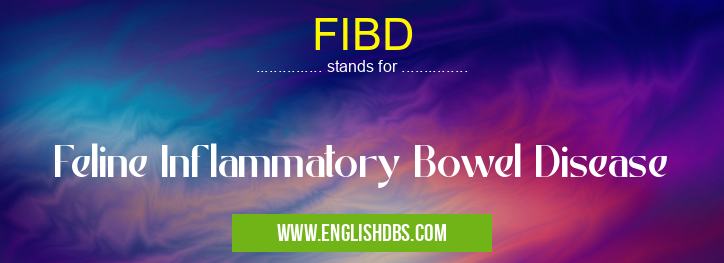What does FIBD mean in VETERINARY
FIBD stands for Feline Inflammatory Bowel Disease, which is a serious condition of the digestive system in cats. It is an often chronic and recurrent disorder that can affect any or all parts of the gastrointestinal (GI) tract. The disease’s cause has not been determined, but it appears to be related to inflammation of the stomach wall and small intestine caused by some type of immune dysfunction. Feline Inflammatory Bowel Disease can affect both cats and kittens, but the most common age range for affected cats is between two to six years old. Feline Inflammatory Bowel Disease usually presents with vomiting, diarrhea, abdominal pain and weight loss.

FIBD meaning in Veterinary in Medical
FIBD mostly used in an acronym Veterinary in Category Medical that means Feline Inflammatory Bowel Disease
Shorthand: FIBD,
Full Form: Feline Inflammatory Bowel Disease
For more information of "Feline Inflammatory Bowel Disease", see the section below.
» Medical » Veterinary
Symptoms
The primary symptom associated with Feline Inflammatory Bowel Disease is vomiting or persistent intermittent vomiting. Other symptoms include diarrhea that may contain blood or mucus, weight loss, poor appetite or anorexia, dehydration due to excessive fluid losses in stool, gastric inflammation causing decreased acidity resulting in decreased absorption of food nutrients leading to malnutrition and abdominal pain from intestinal inflammation. In its more severe forms FIBD may also cause fever and dehydration due to reduced intake of fluids as well as general weakness due to progressive nutritional deficiencies.
Diagnosis
Diagnosis of Feline Inflammatory Bowel Disease involves ruling out other GI diseases such as parasites or infections with tests like full blood work-up including cbc (complete blood count), Felv/FIV testing for feline leukemia virus/feline immunodeficiency virus testing as well as biochemical profile which includes liver enzymes among many others, fecal sample analysis for parasites and antibiotics sensitivity testing in order to rule out infection . Endoscopy may also be performed on affected cats to help diagnose FIBD involving physical examination together with histological evaluation and biopsies obtained from walls of stomach and intestines respectively .
Treatment
Treatment of Feline Inflammatory Bowel Disease depends largely on determining what is causing your cat's particular form of IBD since there are many different possible underlying causes such as bacterial infections , food allergies or sensitivities , environmental allergens , viruses , fungi , protozoa , overgrowth of bad bacteria etc . Depending upon the cause specific treatments will then need to be employed . Common treatment for IBD includes diet manipulation (such as hypoallergenic foods ), antibiotics if bacterial infection is suspected etc . Additionally steroids may be prescribed along with antiemetics like Cerenia® ( maropitant ) which helps reduce nausea & erosive inflammatory damage in stomach thus reducing overall symptoms associated with IBD .
Essential Questions and Answers on Feline Inflammatory Bowel Disease in "MEDICAL»VET"
What is Feline Inflammatory Bowel Disease (FIBD)?
Feline Inflammatory Bowel Disease (FIBD) is a digestive disorder of the intestine and stomach which causes inflammation of the intestinal lining. This condition can be very painful and potentially life-threatening if left untreated.
What are common symptoms of FIBD?
Common symptoms of FIBD include vomiting, diarrhea, loss of appetite, weight loss, abdominal pain or discomfort, and dehydration.
How is FIBD diagnosed?
Diagnosis of FIBD often requires a physical exam, blood tests to assess organ function and rule out other conditions like infections, an X-ray or ultrasound to identify any lesions in the intestines or stomach, and finally a biopsy from the affected area.
What are potential treatments for FIBD?
Potential treatments for FIBD include dietary changes to promote healing, medications such as antibiotics and probiotics to reduce inflammation and strengthen gut wall health, steroids to reduce inflammation throughout the body, surgery to remove any blockages or tumors in the intestines or stomach, and nutritional supplements that provide additional nutrients that may be deficient due to a decreased appetite.
Are some cats more prone to developing FIBD than others?
Certain breeds may be predisposed genetically to developing FIBD such as Siamese cats and British shorthairs; however all cats regardless of breed can develop this condition. In addition elderly cats are more likely to experience this condition compared younger cats.
Is there any way to prevent my cat from developing FIBD?
Unfortunately there is no known way to completely prevent your cat from developing this condition; however good nutrition and regular veterinary check-ups can help diagnose any early signs which may reduce any further complications from arising.
Can stress play a role in the development of FIBD?
Yes stress can play a role in the development of this condition as it has been linked with increased inflammation in the gut when under duress. Providing hideaways for your cat where they feel safe will help minimize their exposure to stressful situations that might worsen their disease if already present.
Final Words:
In conclusion, Feline Inflammatory Bowel Disease is a serious condition that affects the digestive system in cats. While its exact cause has not been determined yet it seems related to inflammation in certains areas such as stomach wall & small intestine caused by some sort of immune dysfunction . Symptoms usually present include vomiting, diarrhea (possibly containing blood or mucus), weight loss & abdominal pain . Diagnostics such as fullblood work-up & endoscopy together with sampling & histology are employed for proper diagnosis while various treatments like diet changes , antibiotics and steroids are used accordingly depending upon underlying causes identified during diagnosis process .
